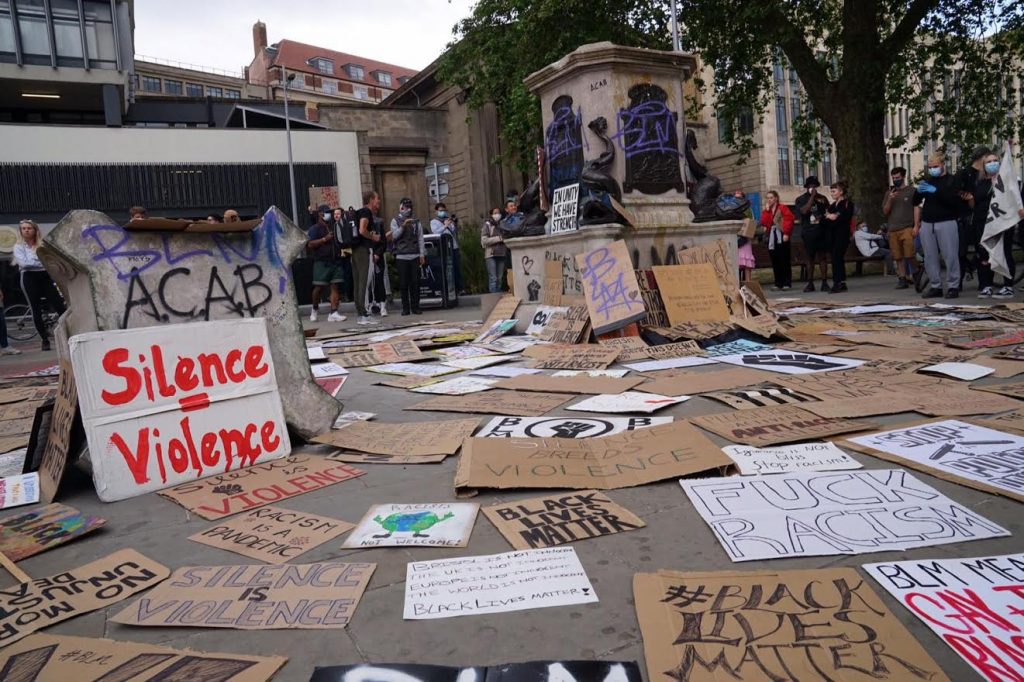Kyla Scott (@__kylascott) is a third year Sociology undergraduate at Newcastle University. In the second of the Black Lives Matter blog series, she writes about the lack of black representation in the British school curriculum as well as the glossing over of the reality of the British Empire. She argues that as long as British history in schools continues to glorify the patriotic narrative of empire and Britain’s imperialist past, a nationalist and racist narrative will continue to shape British society.
In the three weeks since the murder of George Floyd by a police officer in America, there has been a surge in existing calls to address the long-standing whitewashed and Eurocentric British education system. In particular, the current curriculum is criticised for failing to acknowledge the wider reality of the British empire and the UK’s role in the trans-Atlantic slave trade, and for not including positive black role models who are significant to British history. ‘The Black Curriculum’, an educational social enterprise which aims to address the lack of black history in the UK curriculum argues that the:
“Current History National Curriculum systematically omits the contribution of Black British history in favour of a dominant White, Eurocentric curriculum that fails to reflect our multi ethnic and broadly diverse society” (The Black Curriculum, 2020: 2).
Although the current British school curriculum does acknowledge the slave trade and currently covers a range of topics during Black History Month, these are not covered in great depth or detail, with the National Education Union adding this week:
“We must improve the curriculum so that students learn about how Britain was founded on global histories. Students should learn about the achievements and roles of black Britons in every field of human endeavour” (National Education Union, 2020).
It is clear, even from my own educational experience, that the current teaching curriculum in schools does not go far enough to address the atrocities of the British empire.
The current conversations about statues across the country highlight how considerations about black history have previously been missed. For example, the pulling down of the Edward Colston statue in Bristol during the recent Black Lives Matter protests and the negative reactions to this has highlighted a deep lack of knowledge about slavery in the UK.

Photo credit: Phil Riley, B24/7
There had already been calls for the statue to be removed as it was a celebration of an individual involved directly in the slave trade, but these went unheard. There have been protests against other statues across the country, included one of Winston Churchill in London, which was vandalised during the Black Lives Matter protests. These protests have been met by a defence for Churchill that resonates with the way that he is portrayed in the GCSE curriculum: a ‘hero’ who ended World War Two. This representation crucially omits his direct responsibility in the Bengal Famine and his controversial views on eugenics, which I know from personal experience are not taught on the current UK curriculum. Misconceptions about Churchill and wider British history are rooted in the history (mis)taught in UK schools. This is then reflected through the lack of awareness about how statues are seen by many as problematic. This was also seen locally in Newcastle when self-defined ‘statue defenders’ at ‘All Lives Matter’ protests congregated around Grey’s Monument in the city centre as they believed the Black Lives Matter protesters were aiming to deface the statue. The swift call to arms from the statue defenders clearly didn’t allow for enough time to research the subject of their defence as Earl Grey oversaw the Slavery abolition Act in 1833. Rather, the Black Lives Matter protesters were seeking the removal of statues of historical figures who were pro-slavery or racist.
Another broader implication of a lack of black history being taught in the UK curriculum means a large part of our heritage and personal family involvement in colonialism is omitted from history lessons. This is important as “to leave this history out denies the existence of a section of the British population giving an incomplete understanding of British society and its development” (Visram, 1994: 57). This can have a deep impact on the lives of black pupils as the history they are being taught does not relate to their own histories and how these are entwined with Britishness. When schools do teach black history, it is mostly done by placing black history within superficial discussions of slavery or the American Civil Rights changes during the 1960s, further distancing black pupils from their heritage and the role of Britain in the reproduction of racial formations. “The black curriculum seeks to teach black history beyond slavery. The students that we have taught have really benefited from seeing themselves in positive roles…[t]hat it wasn’t just slaves” (The Black Curriculum, 2020). In doing this, black pupils have the opportunity to develop a sense of belong to their past. It is also important for white pupils to critically engage in Britain’s history of treatment of black people in order to understand racism in the present. With this knowledge, children can then become more confident to call out racism when they see it.
How you can help
There are various petitions circulating online that are seeking for parliament to implement changes to the current UK curriculum (e.g. here and here). Alongside signing these, it is important that we all take an active role in educating ourselves on the topics missed from our own education through reading and engaging with a broader understanding of British history. Whilst educating ourselves, uncomfortable conversations with friends and families need to happen in order to use privilege to fight racism.
_______
References
Visram, R. (1994). British history: Whose history? Black perspectives on British History. Teaching History. London: Routledge.
The Black Curriculum (2020). Black British history in the national curriculum report. (31.02.2020)
National Education Union (2020). Black Lives Matter.
